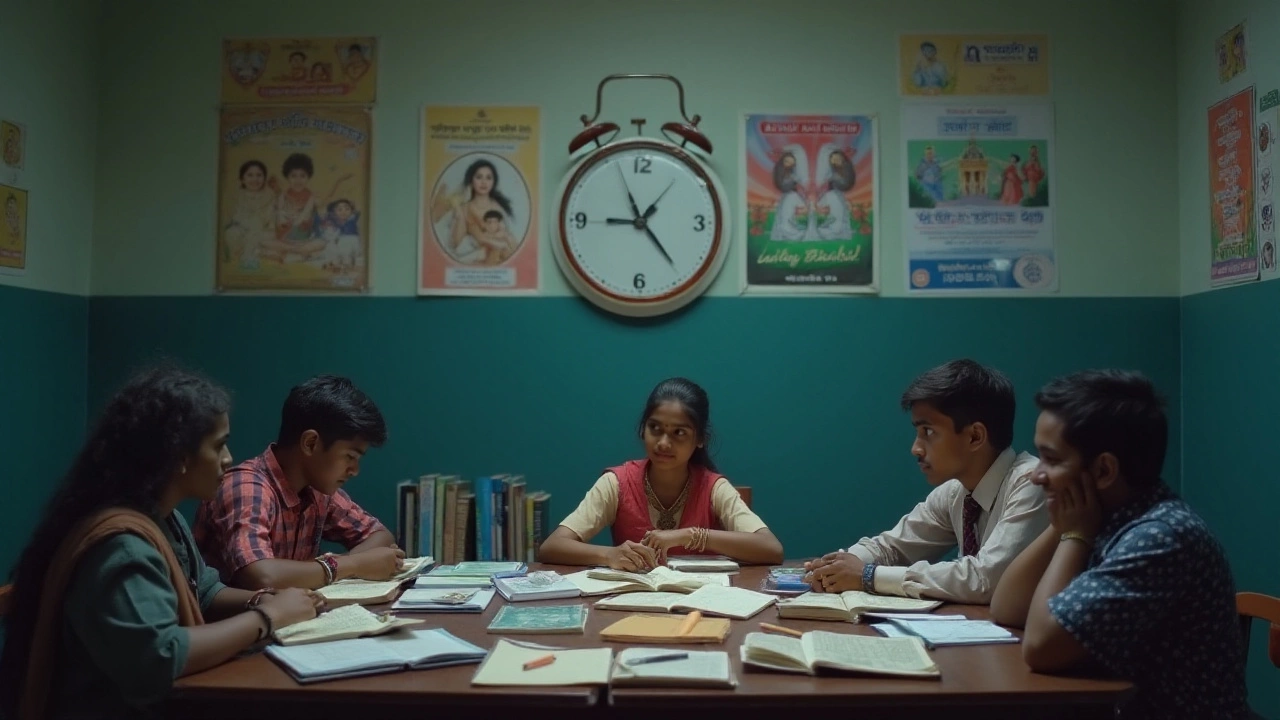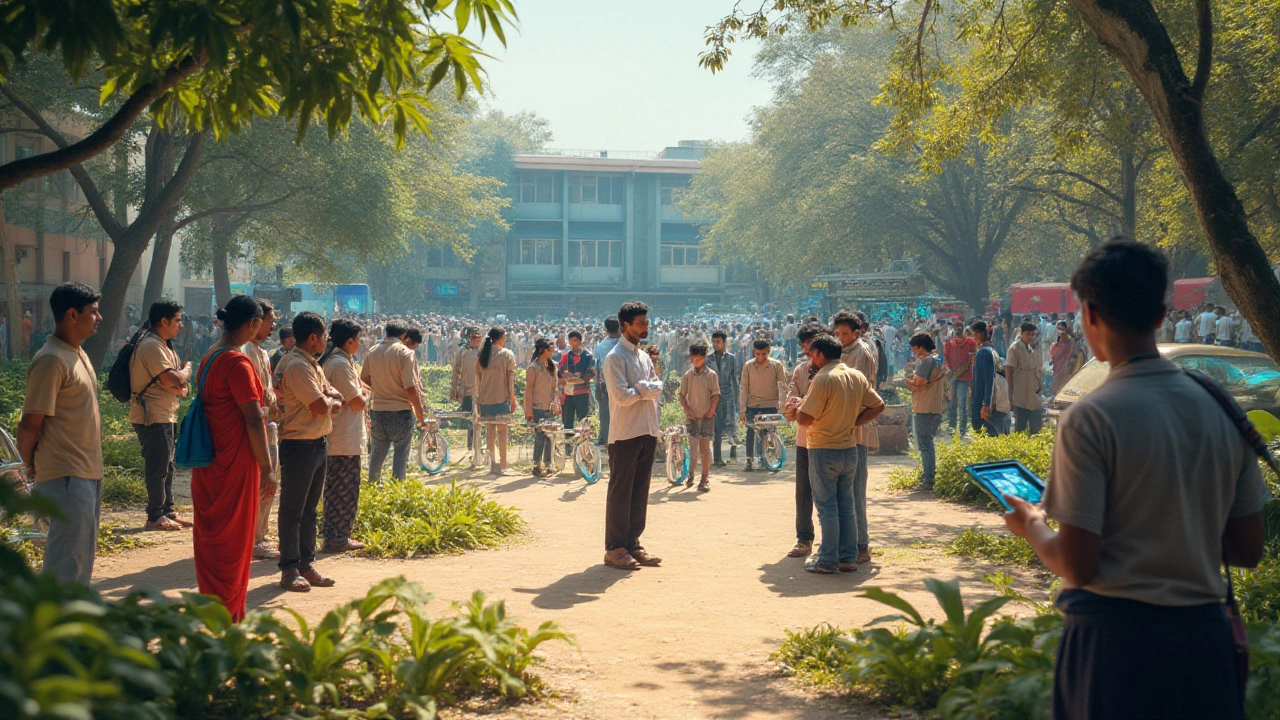Picture this: stacks of notes covering your desk, endless practice tests, a calendar crammed with deadlines, and the pressure of knowing your whole career could hinge on the next big exam. Sound familiar? If you're thinking about a degree that leads to one of those ultra-competitive fields, you're not alone. Some majors simply turn up the heat more than others—often because the exam scene is brutal.
Everyone's got an opinion on what the toughest degree is, but if you're chasing a spot in medicine, law, or engineering, you already know it's no walk in the park. Medical students, for example, don't just juggle classes—they cram for exams like the MCAT and, later, the USMLE. It's not just hours of study; it's months of living, eating, and sleeping around the exam calendar. But it's not just medicine making students sweat. Competitive degrees attract tons of high achievers, so the bar gets higher every year. The pressure? It's real—and feeling stressed is basically part of the degree.
- Why Some Degrees Are So Stressful
- Top Degrees Known for High Stress
- Competitive Exams: The Real Pressure Cooker
- How Students Cope with Intense Stress
- Smart Strategies to Survive and Succeed
Why Some Degrees Are So Stressful
Not every degree is built the same. Some subjects just stack on way more pressure than others. So, what causes a degree to become ridiculously stressful? Usually, it comes down to a mix of workload, high-stakes testing, direct competition, and strict career bottlenecks.
Some programs expect students to handle brutal amounts of coursework and memorize loads of detailed info. Medicine and engineering majors? They’re known for marathon lectures, hours in labs, and major projects. It’s common for med students to clock up to 60–80 hours a week between classes, clinical work, and study time. No wonder burnout rates are so high.
But it’s not just the workload. The real kicker comes from competitive exams—the gateway tests that basically decide your future. If you bomb the big ones (think USMLE, MCAT, LSAT, GATE in India, or engineering licensing tests), your options narrow fast.
- Most stressful degree tracks usually match up with programs where test scores make or break everything.
- Fields like law and medicine often have fewer spots than applicants, so the pressure to stand out is massive.
- Some majors force students into constant grading curves, which can kill confidence and ramp up anxiety.
Here’s a quick look at average weekly hours spent studying by major, based on a survey by the National Survey of Student Engagement (NSSE):
| Major | Average Weekly Study Hours |
|---|---|
| Engineering | 19 |
| Physical Sciences | 18 |
| Biological Sciences/Pre-Med | 17 |
| Social Sciences | 14 |
| Business | 14 |
| Education | 13 |
Degrees with heavy lab work and licensing exams usually top these lists, but it’s not just about raw hours—it’s the type of stress that matters. High expectations, fierce competition, and no guarantee of landing the dream job also keep stress levels sky-high.
Top Degrees Known for High Stress
If there was an Olympics for stressful degrees, a few majors would always make the podium. Some degrees just crank up the pressure, mostly because of the mind-bending workload, tricky exams, or both. Let’s break down which ones regularly leave students bleary-eyed and running on caffeine.
Medicine tops the charts. Med school isn’t just more difficult classes—think years of no real breaks, practical rotations, and prep for monster exams like the USMLE. You basically have to learn an entirely new language and then prove you can use it fast. One recent survey found more than 70% of med students reported "high stress" levels during exam seasons.
Law isn’t far behind. Students memorize massive volumes of case law, write nonstop, and prep for the dreaded bar exam, which has a national first-time pass rate dipping below 80% in recent years. Law school is more than just reading—it’s being able to write sharp, think fast, and debate under pressure.
Engineering students are famous for pulling all-nighters. There’s a never-ending stream of tests, labs, and team projects. In the U.S., about half of engineering students say they feel overwhelmed by coursework at least once per week. No kidding—those problem sets are killer.
Don’t forget architecture. The deadlines, critics, and design reviews all stack up. On average, architecture majors spend 22+ hours per week on homework, way above the campus average for other fields. Factor in final crits where the pressure to impress is massive.
Check out how some of these majors compare when it comes to weekly study hours and reported stress:
| Degree | Average Weekly Study Hours | Students Reporting High Stress (%) |
|---|---|---|
| Medicine | 28 | 70 |
| Architecture | 22 | 65 |
| Engineering | 19 | 60 |
| Law | 20 | 68 |
Of course, any major can get rough, but these four climb right to the top for stress. The combo of long hours, constant grading, and sky-high expectations means students have to adopt strong coping tactics just to keep up. When it comes to picking the most stressful degree, these are the names that keep popping up, especially for anyone eyeing tough competitive exams.

Competitive Exams: The Real Pressure Cooker
If you ask anyone who’s been through it, prepping for competitive exams is a whole different beast compared to regular classes. It’s not just about memorizing facts. These exams decide who actually gets to start their dream career. Mess up, and you might need to repeat the grind for another year. No wonder students call it a pressure cooker.
Look at med school. The MCAT, which everyone needs before even getting in, clocks in at 7.5 hours. The average test-taker studies for around 300 hours, and many squeeze all that prep into a single summer. That’s brutal. And the USMLE Step 1? Some folks push past 400 hours. Law’s no easier—the Bar Exam in the US has a first-time pass rate of just 58% in some states. In India, engineering hopefuls face the Joint Entrance Exam, where out of nearly 1.2 million candidates, less than 2% get into IITs.
Dr. Chan, a senior professor of medicine, says, "It’s not just the content, but the idea that your whole life feels like it’s riding on a single test—that’s what gets to people."
It’s interesting how each country’s biggest competitive exams turn into national events. Parents, friends, and even distant relatives all get involved. For some, it’s the SATs, for others, the LSAT, or entrance tests like NEET and JEE. What they all share is the crazy amount of preparation and stress involved.
| Exam | Average Prep Time | Acceptance/Pass Rate |
|---|---|---|
| MCAT (US) | 300 hours+ | ~41% |
| USMLE Step 1 (US) | 400 hours+ | 96% (after med school screening) |
| Bar Exam (US) | 400-600 hours | 58% (CA, July 2024) |
| IIT JEE (India) | 2-3 years | ~2% |
| NEET (India) | 1-2 years | ~5% |
Why are these tests so intense? They basically weed out anyone who isn’t 100% dead set on getting in. There’s no shortcut or magic trick—just mountains of studying, full dedication, and a whole lot of caffeine. For anyone considering a major with these high-stakes exams, knowing what you’re signing up for is half the battle.
How Students Cope with Intense Stress
When the deadlines and competitive exams start piling up, students have to find ways to handle the pressure or it can wreck their health. Over 70% of college students in the US say they feel stressed about their studies, and that number spikes even higher among medical and engineering students. But how do those in the most stressful degree programs keep it together?
First off, students lean hard on each other. Peer support isn’t just about venting—it’s about swapping notes, sharing resources, and sometimes just grabbing a coffee together to clear the brain fog. Study groups are lifesavers for tough subjects because explaining things to someone else actually helps you understand better. Even a group chat can make you feel less alone.
Talking with professionals helps too. Most universities offer free or low-cost counseling and stress management workshops. These aren’t just for hitting rock-bottom; they’re actually popular for building habits before things spiral. Apps like Headspace and Calm are now a staple for students wanting quick, private stress relief through guided meditation or breathing exercises.
Physical health plays a surprisingly big role in mental stamina. Students who get regular exercise, even a 30-minute walk several times a week, report lower levels of burnout. Sleep is huge. According to a 2024 study from the American College Health Association, students who slept at least seven hours scored 15% higher on high-stakes exams compared to the always-tired crowd.
Here’s a peek at some stats that stand out:
| Strategy | Reported Usage | Effectiveness (Self-Reported) |
|---|---|---|
| Peer Support/Study Groups | 62% | High |
| Professional Counseling | 28% | Very High |
| Apps (Meditation/Mindfulness) | 37% | Moderate |
| Exercise | 46% | High |
| Sleep Hygiene | 42% | Very High |
When things get particularly overwhelming, some students use block scheduling—picking fixed hours for work and free time—to keep life in balance and reduce procrastination. Others swear by simple food prep (think meal prepping on Sundays) just so survival doesn’t depend on instant noodles. It’s not glamorous, but it works.
And for anyone facing the grind, the best tip? Don’t try to do it alone. Reach out, try a few strategies, and take breaks before your brain hits the wall. No competitive exam is worth sacrificing your sanity or health.

Smart Strategies to Survive and Succeed
No one makes it through the most stressful degree without a game plan. The good news? Students in fields like medicine, law, or engineering don’t just wing it; most have tried-and-true strategies to keep things from getting out of hand.
Here’s the deal: Your brain is like a muscle, and cramming all night doesn’t make it stronger. Instead, top-performing students usually:
- Break big chunks of info into small, manageable pieces (think flashcards, spaced repetition apps like Anki, or short study sessions).
- Join or form study groups—according to a survey by the Princeton Review, 61% of MCAT top scorers used group study to keep themselves motivated and spot weak points.
- Use practice exams to learn where their gaps are. For example, USMLE pass rates jump by about 10% for students who take at least five full-length practice tests.
- Stick to a set routine. Studies from the American Psychological Association show that students who set regular study hours are less likely to burn out and more likely to keep up decent sleep habits.
Mental health checks matter too. Competitive programs often offer free or discounted counseling—and they’re worth checking out. Peer mentoring is another tool. Schools like MIT and Johns Hopkins run peer mentor programs, matching upperclassmen with newbies to share hacks and help newbies dodge mistakes.
Want some data? Here’s a quick table showing how often top students use different strategies, based on a 2023 student survey:
| Strategy | Percent of Top Test Takers |
|---|---|
| Practice Exams | 82% |
| Study Groups | 61% |
| Spaced Repetition | 47% |
| Peer Mentoring | 30% |
| Regular Sleep Schedule | 54% |
If you're struggling, don’t just tough it out—ask for help, tweak your routine, or use campus resources. The pressure is real, but with practical steps, you can manage it instead of letting it run the show.



